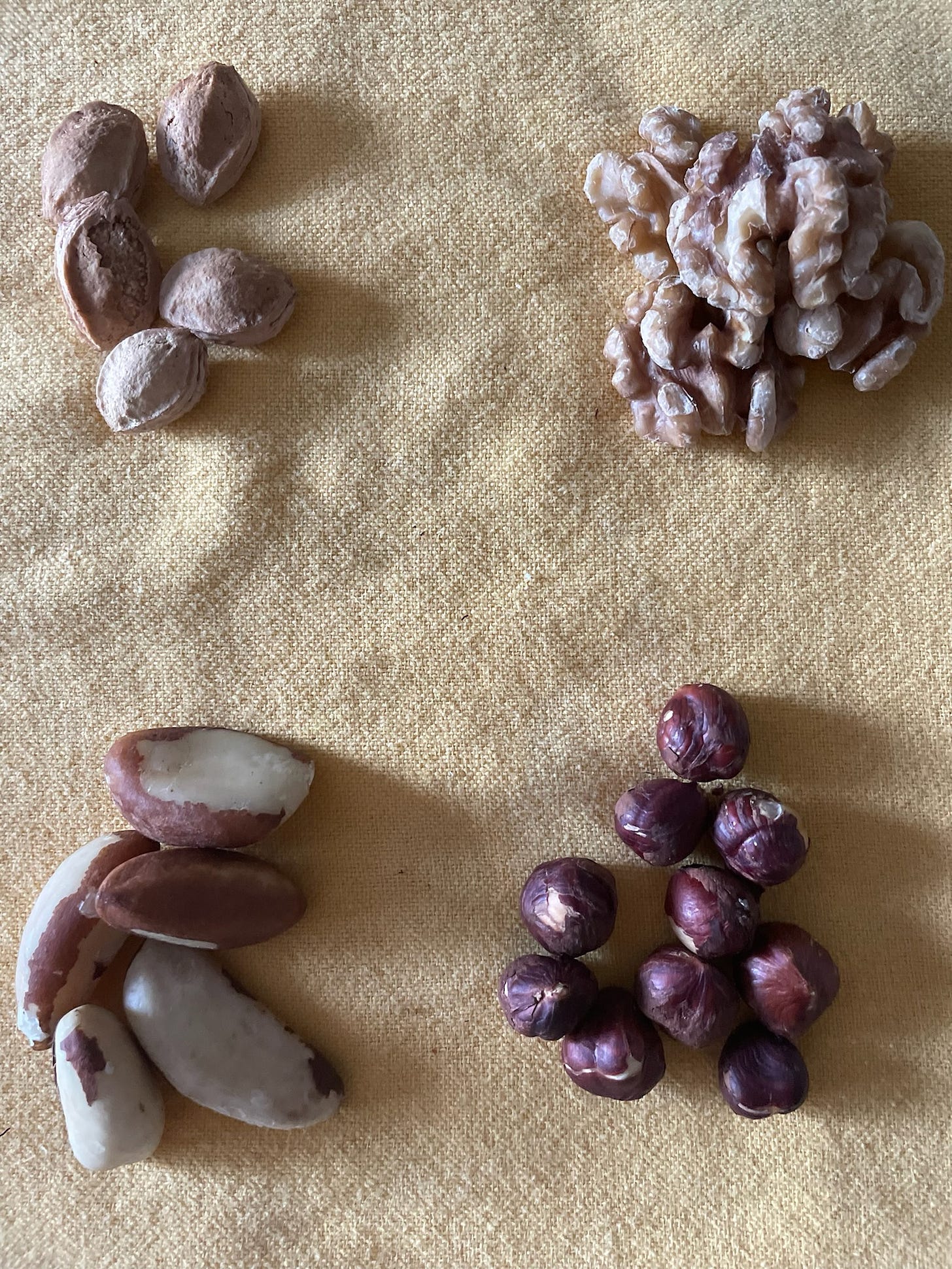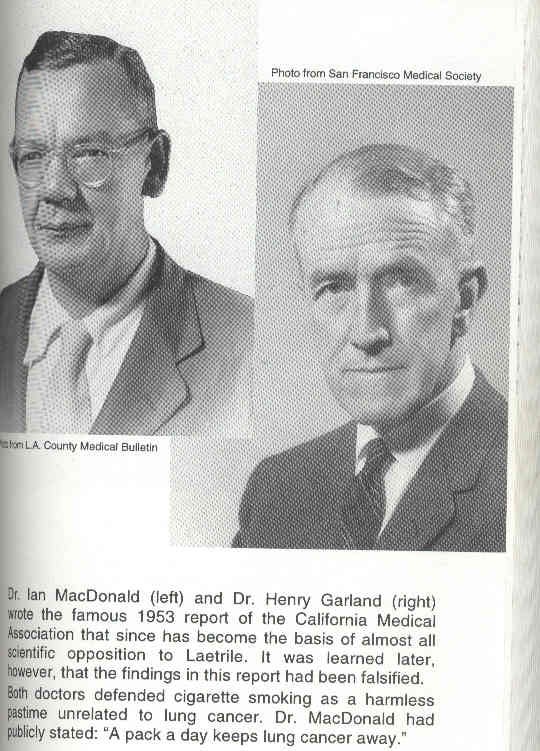Can you spot the one that’s not a nut?
Do you have a favorite?
I’ll tell you why apricot seeds are mine.
They contain cyanide, which is toxic.
Toxic to cancer cells.
This type of hydrogen cyanide is part of a naturally occurring chemical compound called Amygdalin, found in many plants, most notably in the seeds (kernels) of apricots, bitter almonds, apples, peaches, cherries, and plums.
(Fun Friday fact: your brain’s inner region, the amygdala, looks like an almond)
Although technically not a vitamin, Vitamin B-17 was the name given to Amygdalin by bio-chemist Dr. Ernst T Krebs in 1952.
Ready to jump down the apricot rabbit hole?
The devil is in the enzymes:
Laetrile, the extract form of vitamin B17, can help prevent cancer.
It may do this in two ways. The first one revolves around enzymes.
Amygdalin consists of glucose and toxic substances such as benzaldehyde and hydrogen cyanide.
Cyanide in amygdalin only attacks cancer cells.
Healthy cells contain the enzyme rhodanese.
Rhodanese protects the cells by neutralizing the benzaldehyde and cyanide in amygdalin.
Cancer cells do not have rhodanese.
Instead, they have an enzyme called beta-glucosidase.
You can find B17 in the bitter-tasting foods that many of us don’t eat.
In order to improve taste of certain foods, the food industry has eliminated the bitter substances in food.
How much should you eat?
The general rule of thumb is to start with 1 kernel per 10lbs of body weight per day. That’s 15 per day for a 150 lb person.
It’s recommended that you introduce them to your system gradually. Start with 5-10 the first day, and work your way up.
If you overdo it you might get a little nauseous, especially if you eat them on an empty stomach. You can eat them with food in this case.
From the article B-17 / Laetrile: The Alternative Cancer Treatment Suppressed For Over 50 Years:
(link in the comments below)
When the powerful cancer-fighting properties of Amygdalin/B-17 were discovered, the next logical step was to extract and administer this substance in concentrated doses much higher than you can get from eating the seeds, and that’s what Dr. Ernst T. Krebs began to do.
Laetrile is the clinical name given to concentrated B-17 for use in IV injections for medical treatment, which was patented by Krebs.
In the 1950’s and 1960’s word began to spread about the success of cancer treatments using laetrile, and although it was not approved for treatment by the FDA, doctors like John A. Richardson M.D. began using it “illegally” to treat patients at his clinic in San Francisco, and it was working remarkably better than orthodox treatments.
His success with laetrile is documented in Laetrile Case Histories: The Richardson Cancer Clinic Experience by John A. Richardson M.D. and Patricia Irving, R.N. Originally written in 1977, the book was updated in 2005 with follow ups on the patients they treated; many of whom are still alive!
I could stop now, but I won’t, because the story of the suppression of Laetrile is even more amazing.
The use of Laetrile has been repeatedly denounced by various researchers and industry organizations as one of the biggest frauds and quackery in the history of modern medicine.
Researchers like these fine fellows in the attached picture below (read the caption):
That’s right, the same doctors that first demonized Laetrile in 1953, also sang the praises of cigarettes!
In 1972 Sloan Kettering commissioned Dr. Kanematsu Sugiura, their top researcher with over 60 years experience in cancer research to conduct tests over a 5 year period between 1972 and 1977 to determine the effectiveness of Laetrile in cancer treatment.
The Conclusions of Sugiura’s work were:
1. Laetrile inhibited the growth of tumors
2. It stopped the spreading (metastasising) of cancer in mice
3. It relieved pain
4. It acted as a cancer preventative
5. It improved general health
However, at the conclusion of the trials, on June 15, 1977 Sloan Kettering released a press statement that said,
“…laetrile was found to possess neither preventative, nor tumor-regressive, nor anti-metastatic, nor curative anticancer activity.”
After having his five years of research completely railroaded, Dr. Sugiura was asked by a reporter,
“Do you stick by your belief that laetrile stops the spread of cancer?”
He replied famously, “I stick.”
Ralph Moss, head of Public Relations at Sloan Kettering protested against the cover up, blew the whistle in a press conference on November 18 1977, and was fired the next day.
In his words, he was fired for, “failing to carry out my most basic job responsibility, which means to lie when your boss tells you to”.
Two more “definitive” studies were published in 1978 and 1982 showing that laetrile “does not work”. These are the Big Two that the industry still cites today. (link in comments below)
In a nutshell, these studies used already terminally-ill patients, and also reduced the potency of the beneficial Laetrile in question.
Dr. Stephen Krashen Ph.D. from the University of California produced two papers in 2009 showing that both those studies were designed to fail. (email me if you’d like the link)
Why in the world would the cancer industry attempt to discredit Laetrile?
Aren’t they trying to cure cancer?
It can’t be patented.
If it cannot be patented, it cannot produce huge profits.
Therefore it is in direct competition with pharmaceutical drugs.
The pharmaceutical industry has been exposed numerous times rigging studies in order to “prove” that natural therapies don’t work.
I am not a licensed medical professional, but I am a certifiable health nut.
I’ve been eating whole apples, and apricot seeds for many years, and still standing.
Please do your own research as well, and let me know if you have any questions.
Love,
Roman
Private 1:1 Holistic Health Coaching :
Learn how to sync your circadian rhythm and use the Sun in order to:
Amplify your metabolism
Enhance mental focus
Restore sleep.
#cancer #healing







Two more “definitive” studies were published in 1978 and 1982 showing that laetrile “does not work”. These are the Big Two that the industry still cites today.
1. Dr. Charles Moertel, of the Mayo Clinic. – “A clinical trial of amygdalin (Laetrile) in the treatment of human cancer.” N Engl J Med 1982: 306 (4): 201-6.
2. Ellison N, Bvar D, Newell G. “Special report on Laetrile: The NCI Laetrile Review” N Engl J Med 1978: 299 (10): 549-552.
https://www.chrisbeatcancer.com/b17-laetrile-alternative-cancer-treatment-suppressed-50-years/